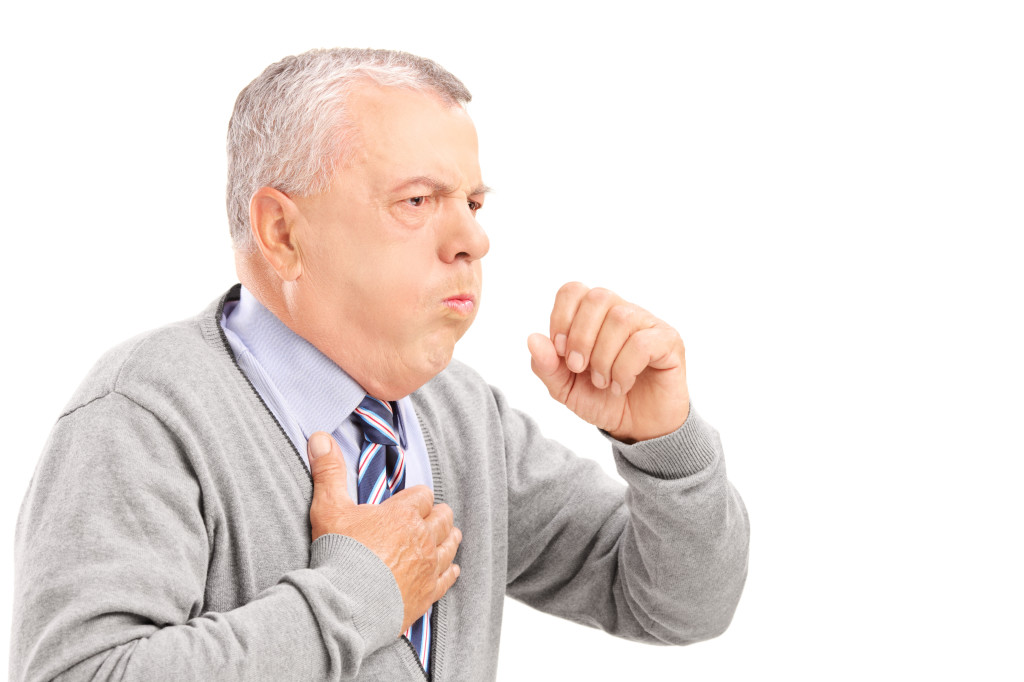
Cough is one of the most common symptoms in pulmonary fibrosis. In fact, some patients will come to medical attention seeking help with their cough. In health, coughing is a protective reflex or mechanism that helps keep our airway free of secretions and debris. We may cough voluntarily or coughing may be triggered by irritation of any part of our respiratory system from our nose all the way down to the tiny air sacs called alveoli at the bottom of our lungs. Cough may even be triggered by irritation of our esophagus from stomach acid that refluxes upwards.
How Long Has the Cough Been Present?
As a pulmonologist, I think about cough in terms of how long the cough has been present. Cough that has been present for a short period of time (days to a few weeks) is most likely related to a viral upper respiratory infection. Bacterial pneumonia may cause cough as well. Seasonal allergies may cause cough that lasts weeks. In contrast, cough that has been going on for more than a couple of months is much less likely to be caused by a transient respiratory virus (common cold) or a blooming flower or tree in the environment.
Cough that has been present for more than two months is referred to as a chronic cough. The first question I ask in evaluating a chronic cough is whether the patient was a smoker or has underlying lung disease. I also review the medication list as ace inhibitors, a commonly used blood pressure medication, causes cough as its most common side effect. Stopping the ace inhibitor leads to improvement in the cough over a few weeks.
GERD (Gastro-Esophageal Reflux)
I take a thorough dietary history, as gastro-esophageal reflux (GERD) is a common cause or amplifier of chronic cough. Patients may not complain of classic chest discomfort that is typical of GERD. In fact, the only symptom of GERD may be a chronic cough. I have written several articles about the approach to treating GERD in pulmonary fibrosis. (links to articles about GERD and pulmonary fibrosis – link 1, link 2, link 3)
Asthma & Post Nasal Drip
Other important causes of chronic cough include cough-variant asthma and post-nasal drip. Patients with cough-variant asthma do not have to wheeze as most asthma patients do. In contrast, their response to airway irritation is frequent coughing. We have a pulmonary function test (methacholine challenge) that is very helpful in making this diagnosis. Post-nasal drip is diagnosed by taking a history and inspecting the nose and back of the throat. There are usually signs of irritation in the back of the throat and patients often complain of the need to frequently clear their throat. The diagnosis is supported by the symptoms of feeling like something is dripping down the back of your throat.
The treatment of cough-variant asthma is similar to the treatment of other types of asthma. Inhaled steroids are very effective. Post-nasal drip is best treated with first generation antihistamines (such as chlorpheniramine or diphenhydramine) combined with a decongestant such as phenylephrine. These are over the counter medications but you may have to ask the pharmacist to help you find them. We sometimes add nasal steroids if there is a component of allergic rhinitis (nasal allergies). Of course you should always consult your doctor before taking or changing any medication.
Treating Cough with Pulmonary Fibrosis
Cough caused by pulmonary fibrosis is terribly frustrating for patients and does not respond to any of the above interventions. It may lead to social isolation, depression and even chest pain and abdominal pain. None of the over the counter medications are uniformly effective. Some patients get relief from cough drops. Other patients get some relief from Mucinex or Guaifenesin. Low dose prednisone may provide relief for others but the side effects of weight gain, osteoporosis, and diabetes need to be weighed carefully against the benefits. In some patients I try nebulized lidocaine. This medication is a local anesthetic and “numbs” the airway. Gabapentin may help a small percentage of patients but be mindful of side effects such as mental slowing and sleepiness. We often prescribe benzonatate. This small capsule is swallowed whole and it may blunt the cough reflex.
The most effective medication for severe cough from pulmonary fibrosis that has not responded adequately to the above interventions is Thalidomide. This very old medication was removed from the market thirty years ago as it caused birth defects when taken during pregnancy. Fortunately, pulmonary fibrosis patients generally are not at risk of getting pregnant (in fact this must be documented before using thalidomide). Doctors who wish to prescribe thalidomide must be registered to do so. Although thalidomide is very effective, all patients experience significant side effects. The most common side effect is numbness and tingling (neuropathy) in the hands and feet. This may not be reversible after stopping the medication. Some patients may have changes in their blood work (low platelets). This is rarely a major problem. Fatigue after starting the medication is common but this improves with time. In my experience, for patients that have severe cough due to pulmonary fibrosis the benefits of thalidomide outweigh the side effects and the medication provides life-changing cough relief.